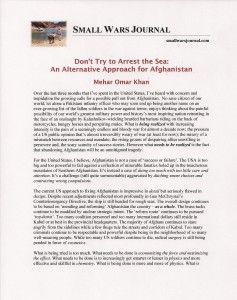
This article is one of two cited by a top US flag officer speaking to COINSOC in Iraq. The other one is Reference: One Tribe at a Time by Maj Jim Gant.
references not steele articles

This article is one of two cited by a top US flag officer speaking to COINSOC in Iraq. The other one is Reference: One Tribe at a Time by Maj Jim Gant.
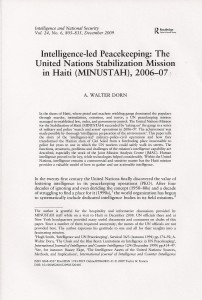
UPDATE: Superceeded by final published version a tReference: Intelligence-Led Peacekeeping
Phi Beta Iota: Dr. Walter Dorn is one of a tiny handful of truly authoritative academic observers of UN intelligence, a pioneer in his own right, and perhaps the only person who has followed UN intelligence from the Congo in the 1960's to the creation of new capabilities in Haiti and elsewhere in the 21st Century. He is the dean of UN intelligence authors. See also Who’s Who in Peace Intelligence: Walter Dorn.
 Boats in Bangladesh. Photo credit: Ahron de Leeuw. |
Home to well over one-fifth of the population, South Asia continues to be a hotbed of conflict and upheaval. Human rights abuses, the war in Afghanistan, and climate change all present critical challenges to the region and to U.S. foreign policy. In our new focus, FPIF contributors examine current obstacles and future solutions in South Asia.
U.S. military strategy in Afghanistan is built on two coups, one in Kabul and the other in Islamabad, writes Shibil Siddiqi in Obama's Surge and Pakistan.
The AfPak Train Wreck: Conn Hallinan says that the president's goals in escalating the war in Afghanistan are deeply flawed. Just ask the Russians.
Adil Shamoo, in Nation-Building in Afghanistan, writes that the United States can learn from the mistakes made in Iraq to craft a new approach for that country.
Robert Naiman, in ‘Legitimacy' in Afghanistan, points out that escalation has just brought more death and destruction. More escalation could close off opportunities for a political solution.
Much of the Afghanistan debate has been centered in the U.S. But what do Afghans think? Gabriela Campos interviews Mariam Nawabi in Underlying Causes of Security in Afghanistan.
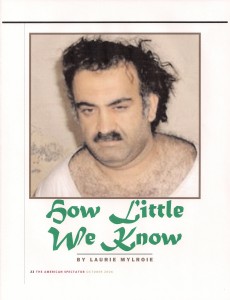
This contribution by Dr. Laurie Mylroie is so good we are also cataloging it as a Historic Contribution. See her Wikipedia page as well. The article appeared originally in The American Spectator (October 2006). As much as we disagree with many of her beliefs on this matter, we do agree that our national intelligence community was not up to the task of determining the best available truth across the board. Her two books:
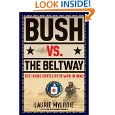

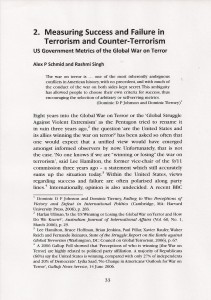
Alex P. Schmid, one of a handful of trully expert scholars in the field of terrorism and counter-terrorism, and his colleague Rashmi Singh, have created a summary that is devasting on multiple fronts. The “Global War on Terror” or GWOT has lasted longer than World Wars I and II combined; the money expended (the authors do not include the military costs of occupying Afghanistan and Iraq) has been enormous, and in all that time, no one has defined the metrics by which to measure the endeavor. The chapter in included in After the War on Terror: Regional and Multilateral Perspectives on Counter-TerrorismStrategy
See also:

The Imperfect is the Enemy of the Good: Anticircumvention Versus Open Innovation
Wendy Seltzer, Berkeley Technology Law Journal, Vol. 25, 2010
Digital Rights Management, law-backed technological control of usage of copyrighted works, is clearly imperfect: It often fails to stop piracy and frequently blocks non-infringing uses. Yet the drive to correct these imperfections masks a deeper conflict, between the DRM system of anticircumvention and open development in the entire surrounding media environment. This conflict, at the heart of the DRM schema, will only deepen, even if other aspects of DRM can be improved. This paper takes a systemic look at the legal, technical, and business environment of DRM to highlight this openness conflict
and its effects.
. . . . . . .
In the full cost-benefit analysis of anticircumvention, the loss to open innovation would outweigh the gains from this imperfect mechanism of copyright enforcement. Treating code literally as law leaves the law with too many harmful side effects.
Continue reading “Reference: Open Innovation vs. Dinosaur Defenses”
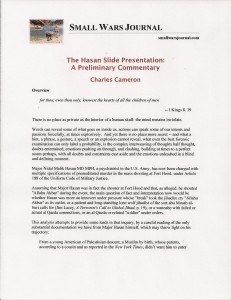
Phi Beta Iota: Berto Jongman flagged this from the Small Wars Journal. It is consistent with our own earlier diagnosis of Cognitive Dissonance, and we recommend it be read in its entirety. At the link below can be found a link to the original slide show. The author stresses the reasonable gravity of the conflict between being a Muslim and being asked to kill other Muslims, and while he avoids recommending a policy, we do not. DoD has been culturally ignorant for too long. It's time we brought both DoD human resource management and DoD counterintelligence into the 21st Century. See also:
Worth a Look: Berto Jongman on Afghanistan, Al Qaeda, CIA Torture, and Maj Nidal Hasan’s Slide Show
Journal: Fort Hood Cognitive Dissonance Round-Up
Journal: Cognitive Dissonance, Military Suicides, and an Alternative Interpretation of the Fort Hood Deaths